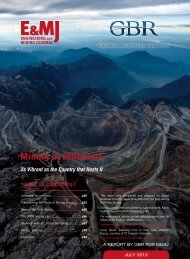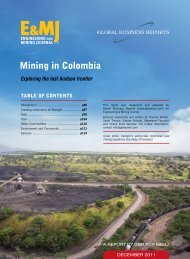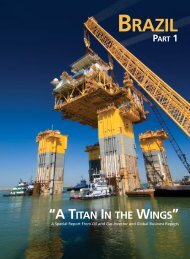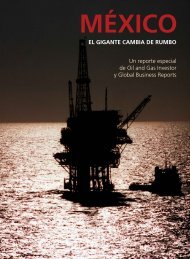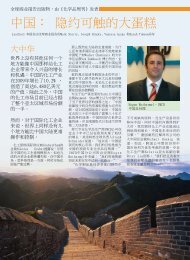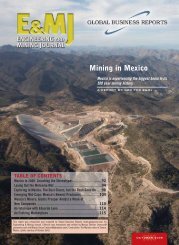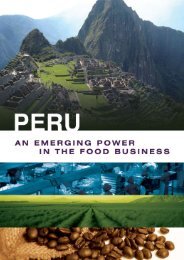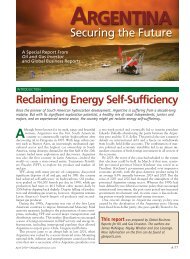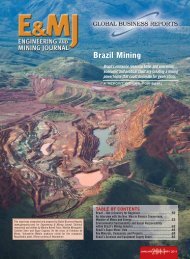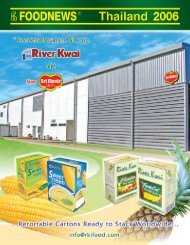Energy Handbook 2011 - GBR
Energy Handbook 2011 - GBR
Energy Handbook 2011 - GBR
Create successful ePaper yourself
Turn your PDF publications into a flip-book with our unique Google optimized e-Paper software.
P o w e r S u m m i t - T h e E n e r g y H a n d b o o k 2 0 1 1<br />
C o u n t r y P r o f i l e : S i n g a p o r e<br />
Transmission and<br />
Distribution<br />
While Singapore took the decision to<br />
liberalise electricity generation, the<br />
transmission and distribution network has<br />
remained in the hands of Singapore Power,<br />
a leading utility company which owns<br />
and operates all of Singapore’s electricity<br />
and gas network. “While our business is<br />
regulated, we run as a corporate entity,<br />
always seeking to enhance our operations<br />
through innovation and rigorous quality<br />
processes,” says Sim Kwong Mian,<br />
Managing Director of SP Power Grid,<br />
which manages and operates Singapore’s<br />
electricity grid. And certainly Singapore<br />
Power has been able to construct<br />
one of the world’s most efficient and<br />
sophisticated underground power grids.<br />
While south-east Asia in general suffers<br />
from imperfect grids and power cuts,<br />
Singapore is distinguished by the reliability<br />
of its power supply. “The nature of the<br />
industry is one where expectations for<br />
Q – How important is<br />
Asia for MTU’s power<br />
products?<br />
A – We have seen<br />
tremendous growth in<br />
our power business in the<br />
last couple of years, and<br />
this looks set to continue<br />
into the future. Currently<br />
about one third of our<br />
revenues in Asia come<br />
from our products to the<br />
power generation industry. The demand for power<br />
in Asia and the region is very high, so we have a<br />
strong position here.<br />
Q – What have been some of the recent projects<br />
that MTU Asia has been involved with in the<br />
region?<br />
A – MTU Asia Singapore has become the hub<br />
for the whole region and thus we engage with<br />
a variety of countries. For example, we recently<br />
launched an office in India, which was officially<br />
opened in February <strong>2011</strong>. India is a very important<br />
market for us in power generation so we are<br />
building up our presence there. We are also<br />
constantly improving our distribution network and<br />
increasing the number of our dealers with respect<br />
quick delivery are very high and constantly<br />
increasing,” says Sim. “The multinational<br />
companies that set up base in Singapore<br />
require a quick start to their operations<br />
and the first thing they need is the speedy<br />
delivery of our services. To manage such<br />
high expectations, we are always pushing<br />
ourselves to deliver in shorter periods of<br />
time. “Over the past years one of our<br />
challenges has been to design the grid in<br />
such a way to prevent any interruptions<br />
in electricity supply and also to minimise<br />
any risk of a voltage dip. As a result we<br />
have built up one of the best transmission<br />
and distribution systems in the world.”<br />
The age of the Singapore grid has<br />
necessitated renewed investment in the<br />
construction of new cable tunnels, both to<br />
replace old cables and to further expand<br />
the grid. In what is expected to be a very<br />
costly investment, the next six or seven<br />
years will see the construction of largescale<br />
tunnels below Singapore to carry<br />
more-efficient transmission cables.<br />
Interview with Hermann Roehm, Director, MTU Onsite <strong>Energy</strong><br />
to our diesel and gas generator sets.<br />
Q – Competition in this region is very high for the<br />
provision of power generators. How do you rate<br />
the levels of competition here and what is MTU<br />
Asia’s competitive advantage?<br />
A – Of course MTU Asia operates in a very<br />
competitive market, but our biggest advantage<br />
is that we develop all of our engines with the<br />
best and most up-to-date technology. We are<br />
a technology leader here, not only for power<br />
generation but for all our products, and especially<br />
when it comes to fuel oil consumption. This is<br />
very important for any continuous applications,<br />
where the major cost driver is the amount of fuel<br />
you consume. If you could save 5–10% in fuel<br />
consumption, then the customer is already very<br />
satisfied.<br />
Q – How do you see MTU Asia’s role developing in<br />
the region?<br />
A – Our key mission is to develop and provide<br />
our customers with very reliable products using<br />
cutting-edge technology in the area of power<br />
generation. We are also focusing on new markets<br />
and our customer base, and we are looking into<br />
long-term partnerships with those customers who<br />
need our technology to operate their power plants<br />
safely and more effectively.<br />
International Power<br />
Market<br />
With electricity demand expected to<br />
balloon in Asia, there has been an<br />
increase in Singaporean companies<br />
playing a role in power plant construction<br />
in the region, as well as an influx of<br />
major international power players like<br />
Wärtsilä, Siemens and GE.<br />
The presence of companies who specialise<br />
in gas, diesel and combined-cycle plants<br />
provides countries in the Asia Pacific with<br />
the opportunity to choose a power plant<br />
most applicable to the local market.<br />
Colben <strong>Energy</strong><br />
The emergence of smaller Singaporebased<br />
power plant companies is another<br />
trend, as an ever-increasing number of<br />
companies have realised the potential of<br />
entering the power industry. As a power<br />
plant constructor and operator in the<br />
south-east Asian region, Colben <strong>Energy</strong><br />
currently operates fossil-fuel, hydro<br />
and biomass power plants in Vietnam,<br />
Cambodia and Malaysia. Diversifying from<br />
its original business in fire protection,<br />
the company ventured into the power<br />
business and most recently has been<br />
targeting renewable energies.<br />
Colben <strong>Energy</strong> positions itself as a smaller<br />
player, but one which has the unique<br />
experience of working in countries where<br />
other companies are afraid to go.<br />
George Tan, CEO of Colben <strong>Energy</strong>, reveals<br />
where his company has an advantage:<br />
“The countries where we work are frontier<br />
countries, and they are very challenging<br />
markets. Most companies are not<br />
attracted to come there and bid for power<br />
plant projects since there are concerns<br />
about these countries’ infrastructures, the<br />
political risk, and the ability of customers<br />
to pay. These countries demand direct<br />
negotiations; they set the parameters and<br />
ask you to put your proposal forward. If<br />
the company is granted approval, it can<br />
negotiate. This is where Colben <strong>Energy</strong><br />
steps in, because we have the experience<br />
of working in those countries and know<br />
how to make the best deals for our<br />
clients.”<br />
Looking ahead, Colben <strong>Energy</strong> plans to<br />
continue its expansion into the region with<br />
a renewed focus on renewable energy<br />
projects. Having learned that the key to<br />
success in south-east Asia is the ability<br />
to have local partners on the ground, the<br />
company plans to increase its presence.<br />
“For a small company to grow, it is<br />
necessary to present its whole track<br />
record and all of its assets,” Tan says.<br />
“Given our successes in the region we<br />
will be seeing ourselves participating in<br />
projects in Vietnam, Cambodia, Thailand,<br />
and Malaysia over the next several years.<br />
We are opening up to opportunities to<br />
find strategic partners or investors as we<br />
continue our work in those countries.”<br />
48 49



